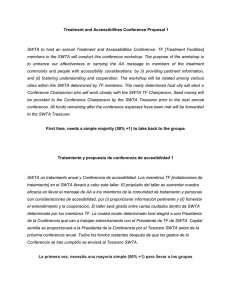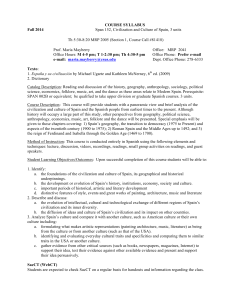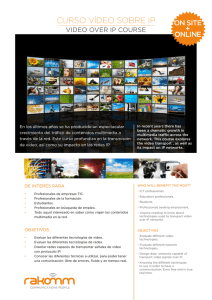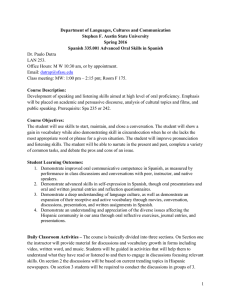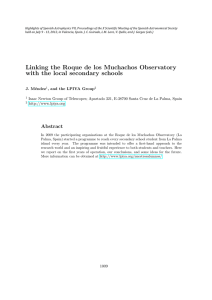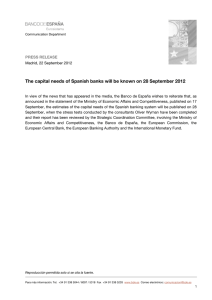Span 152, Civilization and Culture of Spain, 3 units
Anuncio
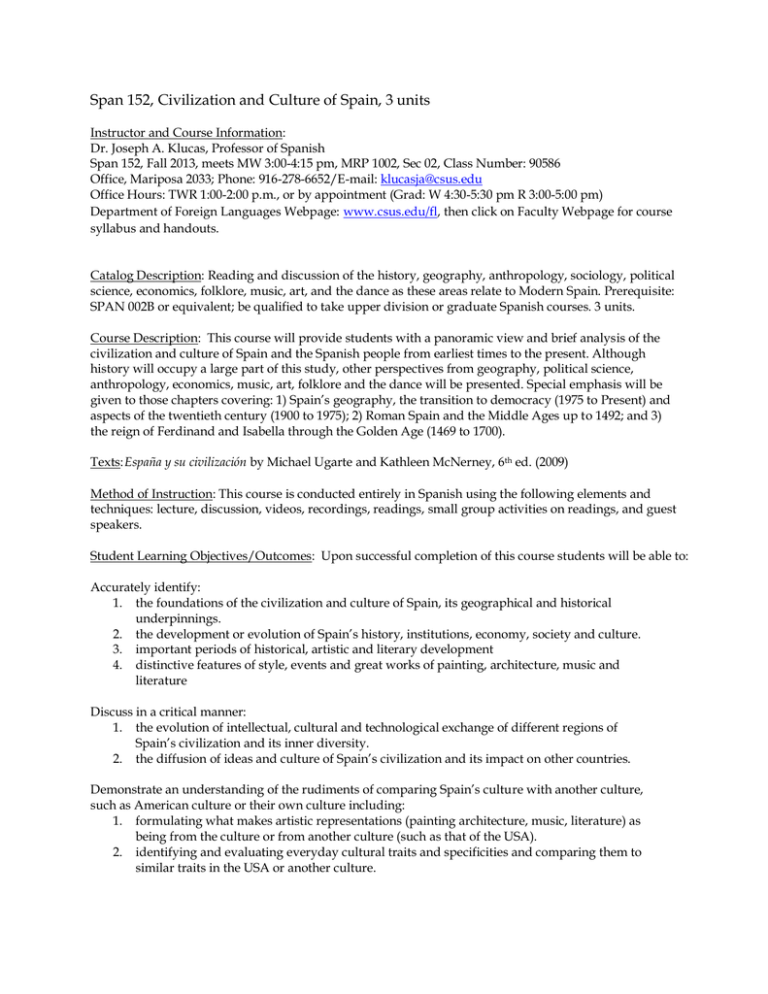
Span 152, Civilization and Culture of Spain, 3 units Instructor and Course Information: Dr. Joseph A. Klucas, Professor of Spanish Span 152, Fall 2013, meets MW 3:00-4:15 pm, MRP 1002, Sec 02, Class Number: 90586 Office, Mariposa 2033; Phone: 916-278-6652/E-mail: klucasja@csus.edu Office Hours: TWR 1:00-2:00 p.m., or by appointment (Grad: W 4:30-5:30 pm R 3:00-5:00 pm) Department of Foreign Languages Webpage: www.csus.edu/fl, then click on Faculty Webpage for course syllabus and handouts. Catalog Description: Reading and discussion of the history, geography, anthropology, sociology, political science, economics, folklore, music, art, and the dance as these areas relate to Modern Spain. Prerequisite: SPAN 002B or equivalent; be qualified to take upper division or graduate Spanish courses. 3 units. Course Description: This course will provide students with a panoramic view and brief analysis of the civilization and culture of Spain and the Spanish people from earliest times to the present. Although history will occupy a large part of this study, other perspectives from geography, political science, anthropology, economics, music, art, folklore and the dance will be presented. Special emphasis will be given to those chapters covering: 1) Spain’s geography, the transition to democracy (1975 to Present) and aspects of the twentieth century (1900 to 1975); 2) Roman Spain and the Middle Ages up to 1492; and 3) the reign of Ferdinand and Isabella through the Golden Age (1469 to 1700). Texts: España y su civilización by Michael Ugarte and Kathleen McNerney, 6th ed. (2009) Method of Instruction: This course is conducted entirely in Spanish using the following elements and techniques: lecture, discussion, videos, recordings, readings, small group activities on readings, and guest speakers. Student Learning Objectives/Outcomes: Upon successful completion of this course students will be able to: Accurately identify: 1. the foundations of the civilization and culture of Spain, its geographical and historical underpinnings. 2. the development or evolution of Spain’s history, institutions, economy, society and culture. 3. important periods of historical, artistic and literary development 4. distinctive features of style, events and great works of painting, architecture, music and literature Discuss in a critical manner: 1. the evolution of intellectual, cultural and technological exchange of different regions of Spain’s civilization and its inner diversity. 2. the diffusion of ideas and culture of Spain’s civilization and its impact on other countries. Demonstrate an understanding of the rudiments of comparing Spain’s culture with another culture, such as American culture or their own culture including: 1. formulating what makes artistic representations (painting architecture, music, literature) as being from the culture or from another culture (such as that of the USA). 2. identifying and evaluating everyday cultural traits and specificities and comparing them to similar traits in the USA or another culture. 2 3. gather evidence from other critical sources (such as books, newspapers, magazines, Internet) to support their idea, test their evidence against other available evidence and present and support their idea persuasively. Map and Paper: Students will be asked 1) to prepare a map of Spain, an outline of which will be handed out in class and 2) to submit one paper (3-4 pages, font size 12, double-spaced) in Spanish that focuses on a specific figure, date or event of historical or cultural importance; or on an artist, composer or a specific work of theirs; or on an aspect or example of Spanish architecture. Both form (spelling, accentuation, grammar and vocabulary) and content are important. Please include some description, analysis and personal opinion in the paper. Please indicate at the end of the paper: the author, title, city, publisher and date of each work consulted under “Obras de consulta.” Exams: There will be 3 exams, each of which will cover the chapters on politics, art, music and literature, plus the lecture material and class notes, of selected periods. The exams will be objective in part: true/false, multiple choice, matching, and analytical as well as: identification and essay, and will focus mainly on Spanish civilization and culture content. Method of Evaluation: Numerical percentages scale: 94-100%=A, 90-93%=A-, 87-89%=B+, 84-86%=B, 80-83=B-, 77-79%=C+, 74-76%=C, 70-73%=C-, 67-69%=D+, 64-66%=D, 60-63%=D-, 59% or less=F Assigned letter grades scale: A=96%, A-=93%, B+=89%, B=86%, B-=83%, C+=79%, C=76%, C-=73%, D+=69%, D=66%, D-=63%, F=56% Map 1 Paper 3 Exams (10%) (15%) (75% or 25% each) (Extra Credit: Oral Presentation in Spanish on Written Paper topic: 5 % points added to final course grade average) Classroom Policies: Attendance: Regular class attendance, coming to class on time, taking careful notes, and turning in assignments when they are due will greatly enhance your chances of success in this course. Please notify me in advance of a missed class or immediately afterwards, prior to the next class meeting. Phone: 278-6652 (klucasja@csus.edu). If you do not notify me promptly, you may forfeit an opportunity to make up a missed exam or turn in a missed homework assignment. There will be no make-up quizzes, exams or oral presentations except in cases of extreme emergency. Avoid all forms of Academic Dishonesty, including cheating and plagiarism. For definitions/sanctions see University Manual (http://www.csus.edu/umanual/student/UMA00150.htm). For examples of how to avoid plagiarism and properly quote sources, see (http://library.csus.edu/content2.asp?pageID=353). Electronic devices: please turn off all phones, iPods and other devices. These are distracting and disruptive. Students are not permitted to make audio or video recordings, or take photos in the classroom. Special Accommodations: If you have a disability and require accommodations, you need to provide disability documentation to SSWD, Lassen Hall 1008, (916-278-6955). Please discuss your accommodation needs with me after class or during my office hours early in the semester. Span 152 (Prof. Klucas) MW 3:00-4:15 pm, in MRP 1002, Sec 02, Code: 90586 Fall 2013 Tentative Schedule Office: Mariposa 2033; Phone: 278-6652/E-mail: klucasja@csus.edu / Dept home page: www.csus.edu/fl Office Hours: TWR 1:00-2:00 p.m., or by appointment (Grad: W 4:30-5:30 pm R 3:00-5:00 pm) Semana (MW) Actividades y Tareas 1 9/2-4 (LABOR DAY) Introducción al curso; Preséntense; Tarea: completar un mapa de España Vídeo: “Rick Steves’ Spain Barcelona, Cataluña ”; discusión Tarea: Introducción—España y las Españas. . . (Ugarte/p. 1-17) Tarea: Temperamento y vida diaria (Ugarte/p. 15-17) 2 9/9-11 Conferencia: la geografía de España; Discusión de las lecturas Vídeo: “Rick Steves’ Spain Madrid, Ávila, Salamanca etc.”; discusión 3 9/16-18 Conferencia: la geografía de España; Discusión de las lecturas Vídeo: “Rick Steves’ Spain Granada, Córdoba, etc.”; discusión Vídeo: "Catalonia and California"; discusión 4 9/23-25 Vídeo: “Rick Steves’ Northern Spain/The Camino”; discusión Conferencia: la geografía de España; Discusión de las lecturas Tarea: Del franquismo a la democracia (Ugarte/Cap. 14, p. 187-95) Tarea: La política actual (Ugarte/Cap. 15, p. 197-205) 5 9/30-10/2 Entreguen los mapas Conferencia: la España actual: la política, la sociedad y la cultura Vídeo: “Francisco Franco” (VH4631); discusión 6 10/7-9 Vídeo: “Spain: Ten Years After”; discusión Conferencia: la España actual: la política, la sociedad y la cultura Tarea: La cultura del pasado a la actualidad (Ugarte/Cap. 16, p. 207-220) 7 10/14-16 Vídeo: “The Soul of Spain” (VH2250); discusión Vídeo: “Picasso and His Time” (DVD 1523); discusión Conferencia: la España actual: la política, la sociedad y la cultura Discusión de las lecturas 8 10/21-23 Examen #1 (La geografía y la España actual) Tarea: España desde sus orígenes hasta la Reconquista (Ugarte/Cap. 1, p. 23-31) 9 10/28-30 Vídeo: “City of Lights: Córdoba, Rise of Islamic Spain”; discusión Vídeo: "Spain: The Moorish Influence" (VH4667) Conferencia: la Prehistoria hasta la Edad Media (celtas, iberos, romanos) Tarea: La literatura española desde su nacimiento hasta el Siglo de Oro (Ugarte/Cap. 2, p. 33-40) Tarea: El arte prehistórico, la arquitectura y la escultura (Ugarte/Cap. 3, p. 42-53) 2 10 11/4-6 Entreguen bosquejo breve (título, tema y aspectos del tema) del trabajo escrito Conferencia: la Prehistoria hasta la Edad Media (romanos, visigodos) Música: “Las Cantigas de Santa María” de Alfonso X el Sabio Discusión de las lecturas 11 11/11-13 (VETERANS DAY Campus Closed) Conferencia: la Prehistoria hasta la Edad Media (árabes, reinos cristianos) Examen #2 (La Prehistoria hasta la Edad Media) 12 11/18-20 Conferencia: Los RRCC; Carlos V; Felipe II y los últimos reyes Habsburgo (bosquejo) Introducción al Siglo de Oro/Vídeo: “Christopher Columbus”; discusión Tarea: La España imperial de los siglos XVI y XVII (Ugarte/Cap. 4, p. 59-71) 13 11/25-27 Conferencia: Los RRCC; Carlos V; Felipe II y los últimos reyes Habsburgo (bosquejo) Retratos de los reyes/las dinastías/la arquitectura de los Siglos de Oro (“handouts”) Tarea: La literatura del Siglo de Oro (Ugarte/Cap. 5, p. 73-84) Tarea: Miguel de Cervantes (Ugarte/Cap. 6, p. 85-92) Tarea: Artistas y músicos del Siglo de Oro (Ugarte/Cap. 7, p. 94-103) 14 12/2-4 Entreguen la versión final del trabajo escrito incluyendo la bibliografía de fuentes generales. Conferencia: Los RRCC; Carlos V; Felipe II y los últimos reyes Habsburgo (bosquejo) Vídeo: “El Greco” (DVD 1524) ; discusión Discusión de la literatura (Ugarte) 15 12/9-11 Conferencia: Los RRCC; Carlos V; Felipe II y los últimos reyes Habsburgo (bosquejo) Vídeo: “Velázquez” (DVD 1522); discusión Discusión de las lecturas (El Greco, Ugarte/Cap. 7, p. 94-97/Velázquez, p. 97-102) Discusión de las lecturas (Cervantes y el Quijote-Ugarte/Cap. 6, p. 85-92) Música religiosa de Tomás Luis de Victoria (Ugarte/Cap. 7, p. 103) Examen #3 (La España imperial y los Siglos de Oro), lunes, 16 de diciembre, 3:00-5:00 pm
